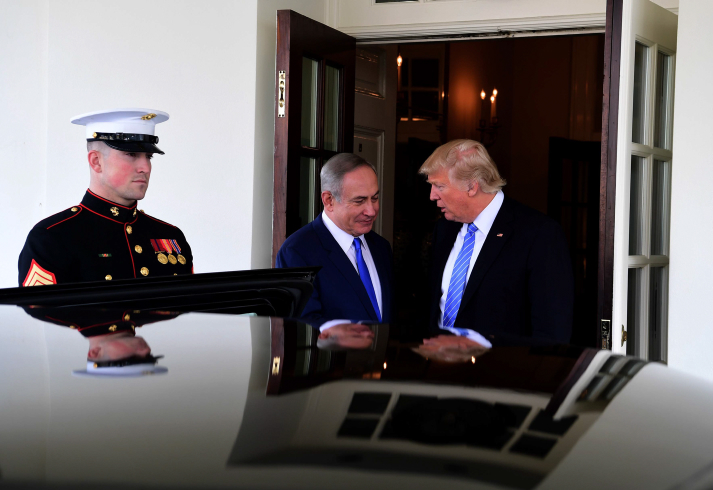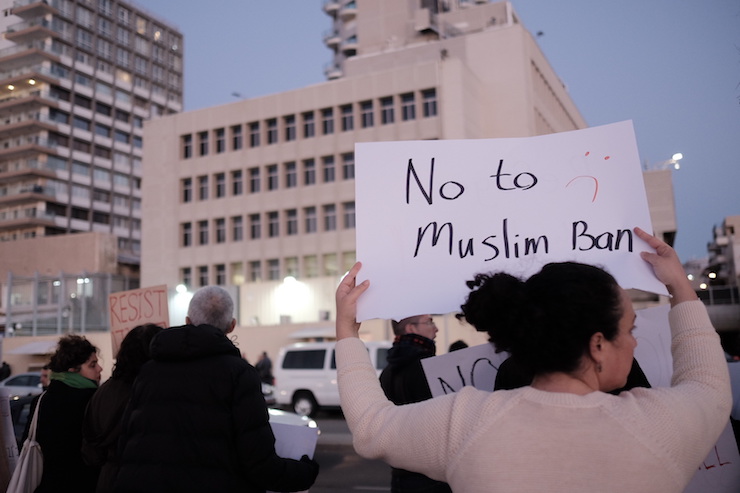Now that the U.S. is being faced with a racist Trump regime, American Jews are being reminded of their own history of oppression, forcing them to make a choice: which side are we on when it comes to Israel?
By Michael Sidman

Blind support for Israel has kept American Jews from supporting Palestinian liberation for too long – but the Trump administration, in one of its accidental silver linings, has finally created the perfect incubator to bring American Jews and Palestinians together. For decades American Jews, guided in no small part by mainstream Jewish organizations, have actively and vocally lent their support to far-right extremist politicians and policies in Israel.
Our otherwise liberal community, which has historically stood staunchly with the American progressive left, was swayed for decades by the tactics of Israeli Jewish supremacists, racists, and xenophobes in Israeli government and society. Many have chalked it up to the phrase I’ve heard far too often: “progressive except for Israel.” We are now coming to understand that this hypocrisy has expired.
The Israeli government has for too long falsely packaged its extremist agenda as liberal. It has portrayed its raison d’être protecting a liberal minority against perceived enemies (Palestinians and their supporters) – and we ate it up. It was our unwavering support that lent the Israeli government the appearance of moral legitimacy for decades. It was our support that allowed Israel to erode its own democracy. And it was our support that led Israel to the brink, where it has left itself with only two choices: be an apartheid state or a fully democratic state with true equal rights for all of its citizens.

Mainstream American Jewish organizations and a surprising number of pulpit rabbis have helped guide the American Jewish community in its unquestioning support for Israel. They exploited anti-Semitism and the real trauma of the Holocaust to try to make the case that Israel was somehow unique in the world — that the laws of morality need not apply to it. American Jews were fed a contradictory mythology, that Israelis were both masters of their domain and yet somehow a persecuted minority on the brink of destruction.
It is similar to the trend we see now among white conservatives who somehow feel as if civil rights for all have somehow eroded their own. The New York Times reported that white men in America believe they are the most powerless demographic, and that straight white men view themselves as a persecuted group. In both cases, in both countries, these are bald-faced lies.
Now that America is being faced with a similarly fascist and racist Trump regime, the American Jewish community is being reminded of its own history of oppression and persecution, as well as its cherished values, forcing us to make a choice: Which side are we on? I’m reminded of Yom Kippur services, when we beat our chests and beg for forgiveness. As I make a list of immoral policies that we have condoned in Israel, and that are now threatening our own democracy, I do the same:
For walls of segregation.
For ghettos.
For scapegoating Muslims.
For rendering Muslims silent and invisible.
For calling the other a terrorist and ignoring the terrorist that is one of mine.
For banning and incarcerating refugees.
For deporting refugees back to genocidal regimes.
For abandoning women.
For fostering religious extremism under the guise of freedom.
American Jewish history binds us to the Palestinian cause. We can understand their persecution, we can understand their diaspora, we can understand their struggle to keep their culture alive, and we can understand their desire for self-determination. As we have seen every day since the election, Muslims and Jews are coming together across the country, realizing that we are natural allies, brothers and sisters in the righteous fight against our foes. This alliance will only last if we recognize Israeli oppression and rampant militarism for what it is.

I once had a liberal Israeli politician tell me that while she appreciated Jewish American opinions on Israel, she wished we would stay out of their decisions. It feels like a common Israeli refrain: give us your money and support everything we do, but mind your own business. I was a devoted Zionist all my life. I learned the Israeli national anthem when I was in Kindergarten. I went to a Zionist school. I had my bar mitzvah at the Western Wall. I led Birthright trips. I worked for Zionist organizations. I was taught that Israel was my country. I was taught to give Israel my money.
For a long time, I fought back — demanding that Israel is my country too, and that my voice needed to be heard. In the end, however, I realized that Israel is not my country. The IDF is not my army. The Israeli prime minister is not the king of worldwide Jewry. The Israeli occupation is, however, sustained by American support, largely due to Jewish American pressure.
For one simple reason, young American Jews are turning away from their community’s blind support for Israel and its occupation — it is the right thing to do. When we finally begin to see Israel with clear eyes, we can help it become the country it was meant to be: a haven, not just for Jews but for all, where Jews can practice their autonomy without infringing on the basic human rights of any neighbor.
Michael Sidman is a communications director and writer in New York City. His personal life and career have focused on human rights issues in Israel/Palestine and the United States.

